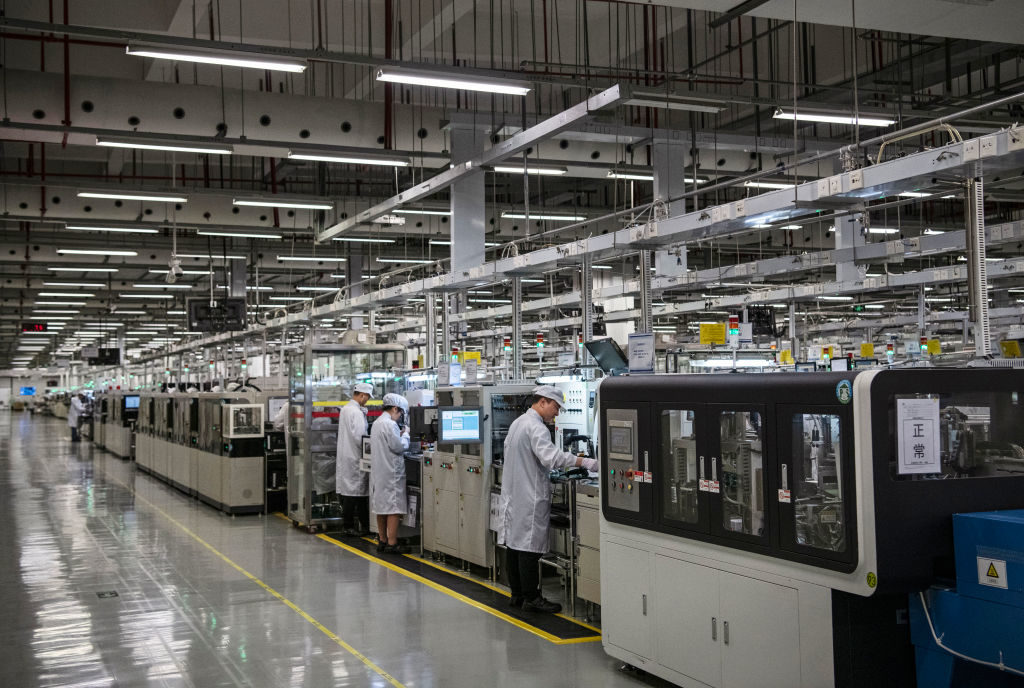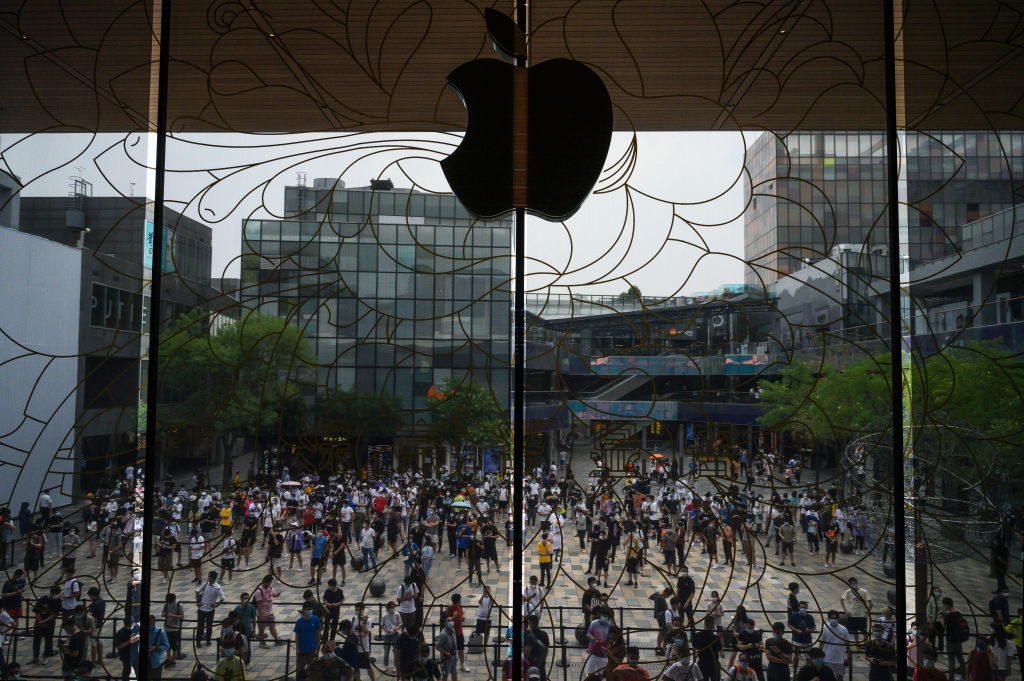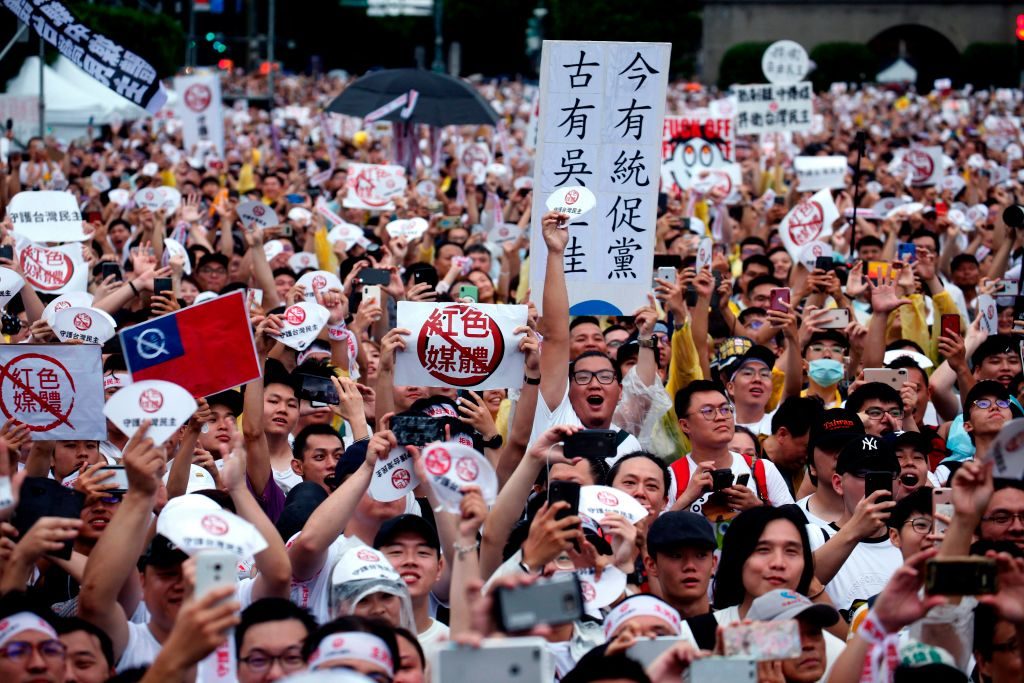Gowns, masks, and gloves were in short supply in April during the peak of the Covid-19 outbreak in New York City. New York Governor Andrew Cuomo and Mayor Bill de Blasio were scrambling to find enough protective gear for hospital staff, sick patients, and essential workers. They made impassioned pleas to President Donald Trump to enact the Defense Production Act, which would compel American companies such as Ford and General Motors to shift from making cars to making pandemic supplies as the global supply chain failed.
With sirens screaming around the city, one could only ask if this was how the world ended—not with a bang but with a shortage of simple cotton masks and plastic gloves?
decoupling
The separation or disentanglement of one thing from another—for example, the U.S. and Chinese economies.
Medical supplies are increasingly manufactured in China. Right now, China can make 150 tons of the fabric used for masks a day, according to a report from the New York Times. This means China can produce 15 times as much fabric as the United States, even after U.S. production has been ramped up.
If the economic relationship between the United States and China deteriorates, will the United States have access to those supplies when the next health crisis happens? Or will it be scrambling to save lives once again?
Concerned about national security, intellectual property theft, and human rights, U.S. policymakers are debating the need for disentangling the U.S. and Chinese economies—especially high-tech industries. Advocates of decoupling believe that radical change is necessary to address security threats and prevent the Chinese political and economic model from spreading globally. But critics insist that decoupling would greatly increase costs for companies and consumers alike and risk a dangerous escalation in the geopolitical tension between China and the United States.
But efforts to decouple with the world’s second-largest economy are complicated by highly interdependent technology supply chains. Whichever viewpoint prevails, the nature of the U.S.-China economic relationship will change in the coming years, with profound consequences for both countries and the world.
What We Talk About When We Talk About Decoupling
As China has become more integrated into the world economy, the United States and China have come to rely heavily upon each other for trade and manufacturing. When thinking about decoupling, it is easier to view it as a spectrum: on one end, China and the United States continue to integrate their economies as they have in recent decades; the other end supports full decoupling, with both countries disentangling their economies and trade relations.
Proponents of decoupling believe that this is the only way to control China and stop the threat it poses to intellectual property and national security. Jude Blanchette, the Freeman Chair in China Studies at the Center for Strategic and International Studies (CSIS), says that decoupling should not be viewed as a switch that can be turned off and on. “Decoupling is a verb, not a noun,” he said. “It’s a process.”
Political Conflicts, Economic Consequences
Tensions between the United States and China have been mounting for years, and U.S. policymakers have increasingly turned to imposing tariffs on China. Though this trend predates the Trump administration, they have escalated the economic tit-for-tat dramatically. Human rights violations in China’s Xinjiang region, security concerns about Chinese telecom giant Huawei, allegations against China of intellectual property theft, and China’s escalating crackdown on Hong Kong have all increased tensions between the United States and China.
“China actually predates the United States in thinking about decoupling, despite its externally, observable rhetoric of being a champion of globalization,” said Blanchette. According to Blanchette, since 2008, China has been thinking about how to “maintain competitive edge, while delinking, decoupling, [and] bifurcating from some of the areas that are more problematic.”
The controversy surrounding Huawei has raised national security concerns for some American policymakers. Huawei, one of the world’s telecom giants, has been accused by the U.S. government of having links to Chinese intelligence, which could open the door for future spying. In January, despite the accusations against Huawei, British officials said these concerns were overblown and announced that Huawei would be allowed to play a limited role in the United Kingdom’s 5G network.
The director of the FBI, Christopher Wray, warned Americans on July 7 that “Huawei is a serial intellectual property thief, with a pattern and practice of disregarding both the rule of law and the rights of its victims.” On July 14, the United Kingdom reversed its decision of using Huawei equipment, acknowledged U.S. sanctions, and announced it will now ban new Huawei 5G equipment by the beginning of next year.
As for Huawei, the company has denied all of the accusations, saying “Huawei does not work with Chinese intelligence and never has,” and it “has never received any request to add backdoors or spyware to its systems.”
On January 15, phase one of the Economic and Trade Agreement between the United States and China was signed in order to end the trade war that has affected both countries for the past few years. One of the points of the agreement states that anyone in either country can be subject to liability for trade secret misappropriation. Despite the attempt of both countries at building diplomatic relations, a Chinese professor of China’s Tianjin University was charged for committing intellectual property theft on June 26.
The U.S. Department of Justice charged a Chinese citizen with misappropriating intellectual property for the benefit of China. Hao Zhang stole trade secrets from two companies, Avago and Skyworks Solutions. FBI Special Agent in Charge John F. Bennett warned that “Zhang’s conviction should serve as a warning to our adversaries that the FBI and our partners remain committed to aggressively investigating and prosecuting these crimes.” This case is part of a larger pattern of intellectual property theft that may cost American firms over $200 billion per year.
On June 30, China enacted a new law for safeguarding national security in Hong Kong. Critics of the law have argued that it could restrict Hong Kong’s autonomy. Some U.S. government agencies reacted by stating that “the NPCSC’s laws (Standing Committee of the National People’s Congress State) may end up prohibiting activities, behavior, and communications previously legal in Hong Kong.”
Secretary of State Michael Pompeo responded to the passing of the law by saying that the United States will end “exports of U.S. origin defense equipment and will take steps toward imposing the same restrictions on U.S. defense and dual-use technologies to Hong Kong as it does for China.” Pompeo argued that it is no longer possible to distinguish between the export of controlled items to Hong Kong or to mainland China and that the United States cannot risk that these items fall into the hands of China. On July 14, President Donald Trump signed an executive order that imposes sanctions on China in response to its interference with Hong Kong’s autonomy.
Hope For the Best…
In 2001, the United States joined a consortium of countries in welcoming China into the World Trade Organization. Ushered in during an era ripe with enthusiasm for the fruits of globalization, the United States believed China’s induction would inevitably draw the country into alignment with its own ideals and standards.
Twenty years on, the United States instead finds itself increasingly at odds with an economic superpower they had hoped would become an ally. After Xi Jinping was elected as general secretary of the Chinese Communist Party (CCP) in 2012, he began to push a campaign for China to “catch up and overtake” its competitors on the global stage. The cooperation the United States hoped for at the dawn of the millennium has been replaced by increasing concerns over compromised national security, infiltration, and the theft of intellectual property, sending the United States boomeranging back decades by looking to return to an era of less economic interdependence with China.
Policymakers and tech companies have different motivations when discussing the most pressing reasons why the United States should decouple with China. They also find themselves promoting different levels of disentanglement. Large companies with massive and complicated supply chains believe that fully decoupling is an unrealistic and even damaging path to pursue.
IBM International Government Executive Debra Marks, speaking her personal capacity, argued that decoupling would destabilize the world economy by sending multinational corporations scrambling to reestablish means of production in countries that do not have the infrastructure to support the massive demand China is able to supply.
“They don’t have the ports and airports and roads and infrastructure,” Marks said. “And they’re at full capacity now anyway.”
Marks continued, explaining companies would “find it pretty hard now to go and get suppliers that can deliver what they need on time at the right cost.”
Severing the exchange of ideas and technology would mean the United States would also lose out on the innovation that can emerge from cooperative development. Without the inclusion of international developers and students in U.S. companies and classrooms, the country would lose out on the insight they provide.
Marks warns that tech companies pulling further away from China would not only complicate matters for multinational corporations, but also that decoupling would affect consumers as well.
Marks warns that tech companies pulling further away from China would not only complicate matters for multinational corporations, but also that decoupling would affect consumers as well.
“It will be awful, it really will,” Marks said, speaking in her personal capacity on the prospect of decoupling. “It will at the very minimum result in higher prices. It might even result in things not working well together.”
Some tech companies, including IBM, are pushing for policies that protect national security while maintaining a relationship, if a cautious one, with China instead of policies that could create more barriers and deepen the trade war.
Tech companies with a heavy presence in China have proposed ideas such as the “China Plus One” strategy. Companies would maintain operations in China but diversify their supply chains by establishing additional means of production in neighboring countries such as Vietnam of India.
While this might appease some concerns over the United States’ overdependence on Chinese suppliers, the added costs of duplicating production could be passed along to the consumer. In a recent survey of supply chain leaders, 58 percent said the move out of China would result in “additional structural costs.”
“I think that the Trump administration has really upped the ante and has put a lot of fuel on the fire,” Marks said.
…But Prepare For the Worst
There is another end of the spectrum, one that supports the direction of the current administration by arguing that national security will remain in jeopardy until the United States further severs ties with China. Because development in technology over the last decade has left the United States more reliant on software as opposed to hardware, some argue that the United States must aggressively work to keep Chinese companies out of these key systems.
“Military communications take place over the existing civilian telecommunications infrastructure,” said Matt Turpin, former director for China at the U.S. National Security Council. “If you think of infrastructure, the civilian infrastructure can have military purposes, much as roads and railways and ports.”
Software and infrastructure systems developed for civilian consumers are inevitably used by military intelligence as well.

“This infrastructure, which primarily serves as a civilian purpose, has changed and creates national security challenges,” Turpin said.
Considering over 81 percent of the laptops and cell phones imported by the United States come from China, the challenge is a daunting one. The United States has taken steps to protect its technology infrastructure, specifically targeting 5G technology developed by Chinese telecom giant Huawei that could be used to infiltrate communications. These steps range from legislation that bars U.S. firms from buying certain Huawei gear to placing visa restrictions on Huawei employees working in the United States.
The relationship between the developers, suppliers, and customers has evolved to a more complicated level. It is no longer enough to just trust the quality of the materials the United States imports from countries like China, they must also feel assured these goods cannot be used to collect data from their users.
“Trust in the manufacturer used to be a fairly low level of trust,” Turpin said, “now [it] has to be much higher.”
This concern around software and security covers a broad range of technologies, from the cell phones in everyone’s pocket to the farm equipment that puts food on the table.
But there are a variety of perspectives on how the United States should navigate its relationship with China.
“Get 10 people in a room and ask them what they mean by decoupling,” said Blanchette, “and you’re going to get 12 different answers.”
Blanchette argues that the United States is already past the point of no return and that the open-market system preferred by some multinational corporations is a thing of the past.
“I think that the horse is out of the gate on regulatory scrutiny over Chinese investment, and interaction with China is now not going to go back to where it was a year ago,” Blanchette said.
But Blanchette also cautions against moving too far in the other direction.
“I have trouble envisioning the end state that his camp is looking for,” he said, reflecting on the position favored by those like Turpin who perceive China primarily as a rival rather than a collaborator.
Some in favor of protecting the security and financial interests of the United States have proposed that the country disengage from international trade agreements altogether. Advocates of this extreme degree of decoupling include Senator Josh Hawley (R-MO), who introduced a joint resolution to withdraw from the WTO in May and claimed, “the Chinese Communist Party has weaponized the WTO to its benefit at the expense of American workers.”
Ann Lee, former visiting professor at Peking University, adjunct professor at NYU, and author of Will China’s Economy Collapse?, cautioned against these more extreme measures.
Lee warned decoupling to this degree would make China a “peer competitor” of the United States instead of its collaborator. This path “would guarantee increased military budgets that would enable defense contractors, tech companies like Google, and the military to profit at the expense of the rest of America who can no longer manufacture in China or have access to China’s market,” Lee said.
A lack of consensus from top experts on what decoupling could look like makes it even more difficult to understand the potential consequences.
“The world is interdependent,” Lee said. “And no country has a monopoly on all good ideas.”
“To stop doing business with the second-largest economy in the world would mean cutting off economic opportunities for most Americans and ending collaborative research that benefits all of humanity,” Lee said.
Consequences of Decoupling
While nobody knows exactly what a post-decoupling world would look like, it would undoubtedly be a painful transition. Much like the analogy of two intergrown tree roots being separated, some parts of the relationship will die. Many fear that the economic costs of moving massive global supply chains could be great. Some also fear that escalating tensions would increase the risk of armed conflict over Taiwan or the South China Sea.
When looking at the future of economic decoupling, supply chains become fragile. Companies will be forced to decide if they need to keep some factories in China to produce Chinese compatible goods while moving other factories elsewhere to satisfy U.S. demands for decoupling, creating two supply chains. The price of goods would generally rise, impacting companies and consumers alike.
Analysis at Morgan Stanley found that too many tech companies are financially cash-strapped and cannot afford to move supply chains in the near future, according to a Market Watch report.
“Technology vendors are encouraged by the pace at which China’s production has ramped up post the Covid-19 shock, and this has reinforced their belief in locating the production of their high-volume products in China,” said Katy Huberty, head of equity research for North America Technology Hardware at Morgan Stanley, in April. “This provides reassurance that China will remain a large base for manufacturing in these products.”
Tearing Apart Tech Industries
In the scenario where China and the United States decouple economically, China risks alienating U.S.-based technology companies. The Peterson Institute for International Economics laid out that many U.S. financial institutions have begun to take advantage of China’s economic liberalization in the past year.
PayPal is the first foreign company to join Chinese domestic online banking, which has helped to propel the company toward an estimated value of $100 trillion by 2023. American Express has been the first foreign credit card company to compete within China, with Visa and MasterCard following closely behind. Goldman Sachs and JP Morgan have both increased their stakes in their joint venture.
These moves show that there are many potentially lucrative opportunities for partnerships between U.S. and Chinese financial institutions at the moment. However, with decoupling, these firms would have no choice but to leave, potentially hurting the financial sectors of both countries.
Tech companies such as Apple could also bear the brunt of the consequences of decoupling. Apple, which is worth $1.3 trillion in 2020, depends on China for 16 percent of its revenue, according to Nikkei.

Writing for Foreign Affairs in June, Henry Farrell and Abraham Newman warned of the impossible task of decoupling. Foreign tech competitors would be forced to rely less on American technology. This has already been seen with the Trump administration’s refusal to allow Huawei to compete in the U.S. technology sphere.
“Blocking Huawei’s access to U.S. technology, for example, may just encourage foreign companies to redesign their supply chains around non-U.S. technologies,” Farrell and Newman wrote.
Diplomatic Debates
As economic relations begin to sour, diplomatic relations would also be deeply affected by decoupling in the future. Potentially facing Cold War-like relations, tit-for-tat retaliation will become commonplace and challenge both countries’ statuses as world leaders.
The Cold War brings memories of tense relations between the U.S. and the Soviet Union, with each one engaged in an arms race to become the world’s nuclear superpower. If the United States were to enter into a new-age cold war with China, who have been building their military power since Xi Jinping election, it’s unknown what the outcome may be.
“I would hope that we could identify that there is sort of the small c, small w concept of a cold war being a condition of rivalry between nation-states”
Matt Turpin
“‘Cold war’ evokes a certain set of assumptions about geopolitical competition,” Turpin said. “I think that term is an unfortunate term for us to be imposing upon the conditions that exist today which are very different.”
The conditions that exist today, including escalating trade tensions and serious concerns about human rights, will not be going away in the next decade. Turpin sees China and the United States entering into an era of increasing political hostilities, which could increase the risk of rapid and dangerous escalations in the future.
In this new cold war, soft power will be king. China and the United States could use their diplomatic positions to stop issuing visas and curtail travel between the two countries altogether. This is already occurring, with Chinese graduate students and researchers suffering the consequences.
“Targeting only some potential professors, scholars, students and visitors from China is a lower level of stereotyping than banning all,” Frank Wu, the incoming president of Queens College, told the New York Times. “But it is still selective, based on national origin.”
More Than Just Trade War
In addition to the economic consequences of decoupling, there are also real risks that decoupling could escalate the geopolitical tensions between the United States and China. And Taiwan—one of the most dangerous flash points in the relationship—could be in an especially precarious situation.

Decoupling could damage the economic relationship between Taiwan and China, a vital incentive for peaceful coexistence, increasing the risk of armed conflict for the island.
Taiwan’s growing economy has relied extensively on its relationship with China. Forty percent of Taiwanese exports go to China, according to CSIS, and the Taiwanese chip company TSMC relies on Huawei for 12 percent of its revenue. If the United States were to place further restrictions on Chinese technology, companies such as TSMC would be caught in the middle.
Writing for the National Interest, Graham Allison laid out several scenarios under which this economic tension could escalate into a military confrontation between the United States and China over Taiwan. While he judged such a conflict to be unlikely, rising economic tensions would only add more volatility to an already risky situation.
Where Do We Go From Here?
Although the United States and China are in an uncertain period in their relationship, experts generally agree that decoupling is a process that would take years to play out. While Covid-19 has reinvigorated the debate, there is still time for both countries to plan for the future.
“We’re in this pendulum swing, and we’re experiencing it right now, which is why no one has any good idea of what the heck is going on, because no one has found the rules or the framework to explain this new order,” Blanchette said.
Whatever the outcome, globalization and the interdependence of world markets will remain. Decisions by U.S. and Chinese leaders in the coming years will shape how the world’s two largest economies interact with each other and the world at large. The shape of that new order will help to determine whether the response to the next pandemic—or the next complex crisis—is effective and coordinated or chaotic and disjointed.
















